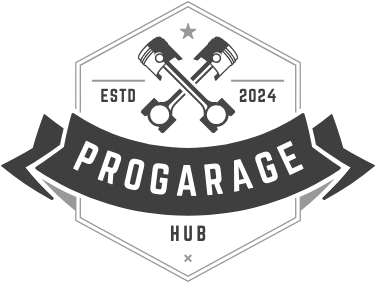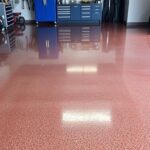If you want to make your garage look better and last longer, think about epoxy floors. These coatings make your garage strong, easy to clean, and look amazing. But, you should know how much it costs before starting.
This guide will cover what affects epoxy floor prices, their benefits, and types. We’ll talk about DIY vs. professional installation and how to pick the right epoxy. You’ll know what it takes to get a top-notch epoxy garage floor by the end.
Key Takeaways
- Epoxy garage floors offer enhanced durability, easy maintenance, and a customizable aesthetic.
- The cost of an epoxy garage floor can vary depending on factors like floor preparation, material, and labor.
- DIY installation may be more cost-effective, but professional application can ensure a high-quality, long-lasting finish.
- Choosing the right epoxy type (water-based or solvent-based) is crucial for achieving the desired results.
- Proper preparation and application are essential for a successful epoxy garage floor project.
What is an Epoxy Garage Floor Coating?
Looking to make your garage stylish and durable? An epoxy garage floor coating might be just what you need. Epoxy is a two-part resin that creates a seamless, glossy finish. It’s loved by many for its benefits.
Understanding the Advantages of Epoxy Floors
Epoxy floors are known for their durability and resistance to spills. They’re also easy to keep clean. The glossy surface can handle heavy use and spills well.
They’re perfect for busy garages. Cleaning them is simple, just a damp mop or quick sweep.
Different Types of Epoxy Floor Coatings
- Water-based epoxy: These eco-friendly coatings are low in VOCs and easy to apply.
- Solvent-based epoxy: Known for their durability and chemical resistance, these coatings offer a glossy finish.
- 100% solids epoxy: This type is the strongest and most resistant to chemicals, great for high-traffic areas.
Exploring garage floor epoxy ideas shows epoxy’s versatility. You can choose from many colors and textures. Whether you need a practical or stylish floor, epoxy can meet your needs.
“Epoxy garage floor coatings offer unparalleled durability, making them a smart investment for any homeowner looking to transform their garage into a functional and stylish space.”
Learning about how to epoxy garage floor diy is exciting. Knowing the benefits of different epoxy coatings helps you choose the best for your garage. This choice will improve your garage’s look and function for years.
How Much Do Epoxy Garage Floors Cost
Thinking about an epoxy floor for your garage? The cost is a big factor. Prices vary a lot. On average, expect to pay $3 to $12 per square foot for a pro installation.
DIY kits for a single-car garage cost between $50 and $300. This makes them a good choice for saving money. But, the total cost depends on your garage size, epoxy type, and if you do it yourself or hire a pro.
| Cost Factor | Range |
|---|---|
| Professional Installation (per sq. ft.) | $3 – $12 |
| DIY Epoxy Kits (single-car garage) | $50 – $300 |
The cost of epoxy floors can change based on your project’s needs. Things like your floor’s condition, prep work, and epoxy type affect the price. Also, hiring a pro might add to the cost but ensures a durable finish.
When planning your epoxy garage floor, think about all costs. Research and understand what affects prices. This way, you can choose the best option for your budget and needs.
Factors Affecting the Cost of Epoxy Garage Floors
Several key factors influence the cost of epoxy garage floors. These include the initial floor preparation, material selection, and labor costs. Understanding these can help with planning and budgeting for the project.
Floor Preparation Costs
Before applying epoxy, the garage floor may need extensive preparation. This can involve cleaning, grinding, or fixing cracks. This work can increase the project cost by $1 to $5 per square foot.
Material Costs
The type of epoxy and any additives or sealants affect material costs. Expect to pay $2 to $7 per square foot for the necessary materials.
Labor Costs
Professional installation can be costly. Labor costs range from $2 to $5 per square foot. This depends on the project’s complexity and the contractor’s experience.
| Cost Factor | Cost Range (per sq ft) |
|---|---|
| Floor Preparation | $1 – $5 |
| Materials | $2 – $7 |
| Labor | $2 – $5 |
Understanding these cost factors helps homeowners plan and budget for epoxy garage floors. Whether hiring a professional or doing it yourself, knowing these costs is crucial. It ensures you get the best value for your money.
DIY vs. Professional Installation
Homeowners face a choice when it comes to epoxy coating their garage floors. They can do it themselves or hire a professional. Each option has its own benefits and things to consider.
The do-it-yourself (DIY) route is cheaper, appealing to those watching their budget. DIY kits come with everything you need and instructions. But, getting a top-notch finish needs careful prep and application, skills not everyone has.
Professional installation guarantees a perfect, lasting epoxy floor. Pros have the skills, tools, and knowledge to get it right. It costs more, but the result is often worth it for many.
Think about your DIY skills, garage size, and finish quality when choosing. If you’re new to DIY or have a big garage, a pro might be the better choice. They ensure a job well done.
| DIY Epoxy Garage Floor | Professional Epoxy Garage Floor Installation |
|---|---|
|
|
The choice between how to epoxy garage floor diy or how to professionally epoxy a garage floor depends on your needs and budget. Weigh the pros and cons to pick the best option for your garage.

Garage Floor Epoxy Ideas
Epoxy lets you customize your garage floor in many ways. You can choose from bright colors to unique designs. This makes your garage a true reflection of your style.
Color and Design Options
Epoxy floors come in many colors, from solid tones to metallic and marbled finishes. You can pick a simple look or something bold and colorful. You can also add decorative flakes for a unique touch.
Slip-Resistant Additives
Garage floor epoxy ideas should also think about safety. Adding slip-resistant materials like silica sand makes your floor safer. This helps prevent accidents and makes your garage more functional.
Creating the perfect garage floor epoxy ideas means balancing style and function. With so many options, you can make your garage both beautiful and practical.
“The beauty of garage floor epoxy ideas is that they allow you to personalize your space and make it truly your own.”
How Long Do Epoxy Garage Floors Last?
Epoxy garage floors are known for their durability and long life. They can last 10 to 20 years or more. The floor’s lifespan depends on the epoxy quality, how well the concrete is prepared, and how much it’s used.
With the right care, an epoxy floor can last a long time. It keeps your garage looking good and saves you from often needing to fix or replace it.
Factors Affecting Epoxy Garage Floor Longevity
- Epoxy Quality: The epoxy’s quality greatly affects the floor’s durability. High-quality epoxy can handle garage wear and spills well.
- Surface Preparation: Cleaning, etching, and priming the surface are key. They help the epoxy bond well with the concrete.
- Traffic Levels: How much the floor is used affects its life. Busy garages might need more upkeep or a new floor sooner.
Knowing what affects epoxy floors helps homeowners make better choices. This way, they can keep their floors looking great for years.
| Epoxy Garage Floor Lifespan | Factors Influencing Lifespan |
|---|---|
| 10-20+ years |
|
“With proper care and attention, an epoxy garage floor can provide a long-lasting, low-maintenance solution for your home.”
What is the Best Epoxy for a Garage Floor?
Choosing the right epoxy for your garage floor is important. The type of epoxy affects the floor’s durability, look, and performance. It’s a key decision for your garage’s flooring.
Water-Based vs. Solvent-Based Epoxy
First, you must decide between water-based and solvent-based epoxy. Water-based epoxy is simpler to apply and safer to use. Yet, it might not last as long as solvent-based options. Solvent-based epoxy, however, offers a stronger, more resistant finish. But, it needs more prep and air to apply safely.
Choosing the Right Epoxy for Your Needs
When picking the best epoxy for a garage floor, think about your budget, the concrete’s state, and garage traffic. Water-based epoxy is cheaper and easier to apply. But, if you want the strongest, most chemical-resistant finish, go for solvent-based.
“The type of epoxy you choose can have a significant impact on the overall performance and longevity of your garage floor.”
The best epoxy for a garage floor depends on your needs. Weighing the pros and cons of each type helps you make the right choice. This way, your garage floor will last for years, providing reliable service.
How to Epoxy Garage Floor DIY
Doing an epoxy garage floor project yourself can save money and be rewarding. But, you need to prepare well and apply it right to get a pro look. Start by cleaning and degreasing the concrete. Then, use a grinder or etching solution to make it rough for the epoxy to stick to.
Next, mix the epoxy as the maker says. Use a roller or squeegee to spread it out evenly. Be patient, as rushing can cause bubbles or unevenness.
After applying, let the epoxy dry completely before using the garage again. This can take 24 to 72 hours, depending on the product. With the right tools and steps, your garage can look and work better.
- Thoroughly clean and degrease the concrete surface.
- Use a grinder or etching solution to create a rough, textured surface.
- Mix the two-part epoxy according to the manufacturer’s instructions.
- Apply the epoxy using a roller or squeegee, ensuring an even, bubble-free finish.
- Allow the epoxy to cure fully before returning the garage to use.
| Step | Description | Estimated Time |
|---|---|---|
| Surface Preparation | Cleaning, degreasing, and roughening the concrete | 2-4 hours |
| Epoxy Application | Mixing and applying the epoxy coating | 1-2 hours |
| Curing | Allowing the epoxy to fully cure | 24-72 hours |

“With the right tools and techniques, a DIY epoxy garage floor project can be a rewarding and cost-effective home improvement.”
Remember, paying attention to details and following the maker’s guide is key. By doing it right, you can make your garage durable, lasting, and look great.
How to Professionally Epoxy a Garage Floor
For those who prefer a professional to epoxy their garage floor, the process has several steps. First, the concrete is cleaned, repaired, and prepared for the epoxy. This step is key for a lasting finish.
Then, the epoxy is mixed and applied with special tools. Decorative chips or additives might be added. This ensures the floor is even and meets the homeowner’s needs. After application, the floor cures before it’s ready for use.
Hiring a professional epoxy flooring contractor makes the process easy. They have the skills and tools for a high-quality, long-lasting finish. Their focus on detail and customer satisfaction is unmatched.
“Choosing a professional to handle the epoxy garage floor installation ensures a flawless finish that will stand the test of time.”
A skilled contractor takes care of every step, from preparation to curing. This results in a floor that looks great and lasts long. For those looking to who does epoxy garage floors, going professional is the best choice.
Conclusion
Epoxy garage floors are a great way to make your garage better. This guide helps you understand costs, ideas, and how long they last. It’s packed with useful tips to help you decide.
Choosing the right epoxy is key. You need to know who to hire and what you need. The article explains the DIY and professional options. This helps you pick what’s best for you.
Now you know a lot about epoxy garage floors. You can pick the right one for your garage. With this knowledge, you can make your garage look and feel amazing.





